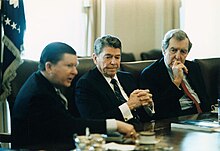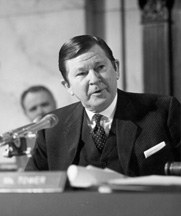John Tower
John Goodwin Tower (born September 29, 1925 in Houston , Texas , † April 5, 1991 in Brunswick , Georgia ) was an American Republican politician who represented the state of Texas in the United States Senate from 1961 to 1985 . He was the first Republican to win the Senate seat for the state of Texas. Not least, he gained notoriety through chairing the Tower Commission named after him to investigate the Iran-Contra affair at the end of the 1980s.
Earlier years and political advancement
After attending several public schools in Texas, Tower received a Master of Arts degree from the University of London in 1953 . Tower showed a political interest early on. Initially involved with the Democrats, he joined the Republicans in 1951 and ran in vain for the Texas House of Representatives . In contrast to the 21st century, the Democrats were the dominant political force in Texas and the rest of the southern United States at that time. In 1956, Tower became a delegate to the Republican National Convention , which Dwight D. Eisenhower nominated for his second term as president . For the 1960 elections, Tower made a first attempt to enter the US Senate. He was able to prevail at the Republican party congress and was nominated. In the actual election, however, with 57 to 41 percent of the vote, he was clearly defeated by the Democratic incumbent and later US President Lyndon B. Johnson , who was known as chairman of the Democratic Senate faction at the time. However, Johnson was elected American Vice President at the same time as John F. Kennedy . As a result, Johnson resigned his Senate mandate in early 1961; Governor Price Daniel appointed William A. Blakley as the new Senator. In May 1961, however, a by-election for the Senate seat was due. Tower ran again and this time won a victory. His triumph was accompanied by great national media interest, as Tower became the first Republican senator from the southern states . The main reason for the Republican success was internal disputes among the Democrats: Blakley, a Conservative Democrat, received little support from many Liberal Democrats (such as Kennedy and Johnson). Therefore, many supporters of the liberal party wing did not vote.
senator
Tower took up his new mandate as Senator in June 1961. He was re-elected in 1966, 1972 and 1978. During his time as a senator, he was a member of several specialist committees, including those for work and welfare, arms production and urban development. In the Senate, he voted against the Civil Rights Act of 1964 and the Voting Rights Act , laws designed to give African Americans more rights. Tower saw the federal states more than the federal government as having a duty here. He also opposed President Lyndon B. Johnson's Great Society program aimed at social equality . Tower, who professed to be the conservative wing of the party, was by no means in agreement with it on all issues. In the 1976 presidential election , for example, he supported the incumbent President Gerald Ford , who was known for more moderate positions, against the conservative Ronald Reagan . In doing so, he drew the anger of many conservatives who called for Ford to be replaced. Tower did not succeed in preventing Reagan from winning in the Texas primary elections, but in the end Ford won his party's top candidacy. In the 1980s, Tower increasingly fell out with the conservative wing of the party, advocating the legalization of abortions and resolutely opposing Reagan's strategic defense initiative .
After a career in the Senate

In 1984 Tower did not stand for re-election and resigned from the Senate in January 1985 after nearly 24 years of service. However, he remained politically active and acted as an advisor to Presidents Ronald Reagan and George Bush senior . In 1987 he chaired the Tower Commission appointed by Reagan to investigate the Iran-Contra affair , in which the Reagan administration was accused of conducting illegal arms deals. In 1989 he was President Bush's preferred candidate for the post of Secretary of Defense, but the Senate refused to give the necessary approval for the appointment. The plenary rejected Bush's proposal by 53 votes to 47.
John Tower and his daughter Marian were killed in a plane crash in Georgia on April 5, 1991 at the age of 65 .
Private life
From 1952 to 1976 Tower was married to Lou Bullington; the marriage had three children. In 1976 the couple divorced. In 1977 he married Lilla Burt Cummings. After the two separated in 1985, the official divorce took place in 1986. This marriage remained childless.
Web links
- John Tower in the Biographical Directory of the United States Congress (English)
- John Tower in the database of Find a Grave (English)
| personal data | |
|---|---|
| SURNAME | Tower, John |
| ALTERNATIVE NAMES | Tower, John Goodwin (full name) |
| BRIEF DESCRIPTION | American politician |
| DATE OF BIRTH | September 29, 1925 |
| PLACE OF BIRTH | Houston , Texas |
| DATE OF DEATH | April 5, 1991 |
| Place of death | Brunswick , Georgia |

